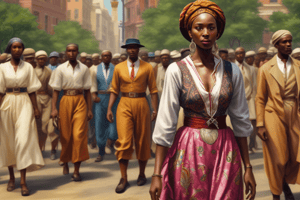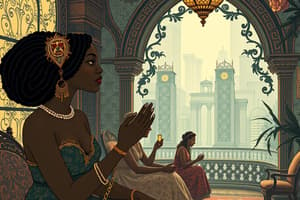Podcast
Questions and Answers
What were the 'Jim Crow laws'?
What were the 'Jim Crow laws'?
- Laws that enforced racial segregation and restricted African American rights (correct)
- Laws that promoted racial equality and protected African American rights
- Laws that abolished racial discrimination and ensured equal opportunities
- Laws that provided reparations to former slaves
What was the impact of the Great Migration on African Americans?
What was the impact of the Great Migration on African Americans?
- It led to increased segregation and limited economic opportunities for African Americans
- It provided opportunities for economic advancement, jobs, and education in the northern and midwestern states (correct)
- It caused a decline in African American population in the United States
- It resulted in the reinforcement of Jim Crow laws in the southern states
What was the significance of Harlem during the Great Migration?
What was the significance of Harlem during the Great Migration?
- It was a place where racial segregation was strictly enforced
- It became a center for enforcing Jim Crow laws in the northern states
- It became a significant location for African Americans moving from the south, determined to build a new life and identity (correct)
- It had limited opportunities for economic advancement for African Americans
What were the circumstances of most former slaves after the Civil War?
What were the circumstances of most former slaves after the Civil War?
What was the impact of white supremacy after the Civil War?
What was the impact of white supremacy after the Civil War?
What did the migrants bring with them to the North?
What did the migrants bring with them to the North?
Where was Archibald Motley born?
Where was Archibald Motley born?
What did Archibald Motley study in France?
What did Archibald Motley study in France?
What did Archibald Motley focus on in the 1930s?
What did Archibald Motley focus on in the 1930s?
What did Motley try to portray through his paintings?
What did Motley try to portray through his paintings?
Who became known as a major inspiration of the new Harlem Renaissance art?
Who became known as a major inspiration of the new Harlem Renaissance art?
What did Aaron Douglas's art primarily depict?
What did Aaron Douglas's art primarily depict?
What was the subject of Jacob Lawrence's masterpiece series?
What was the subject of Jacob Lawrence's masterpiece series?
What artistic style was Jacob Lawrence known for using?
What artistic style was Jacob Lawrence known for using?
'From every southern town migrants left by the hundreds to travel north,' is a panel from which artist's series?
'From every southern town migrants left by the hundreds to travel north,' is a panel from which artist's series?
Flashcards are hidden until you start studying
Study Notes
The Harlem Renaissance and Artists of the Movement
- Harlem was the heart of the Harlem Renaissance, a major cultural movement in the 1920s, with a focus on African American artists, writers, and entertainers.
- The movement led to the development of African American-owned and operated publishing houses, music companies, playhouses, nightclubs, and cabarets in Harlem.
- The Great Depression brought an end to the prosperity of the Harlem Renaissance, but its impact expanded worldwide, challenging racist stereotypes and illuminating the talents of African Americans.
- Aaron Douglas, born in Kansas, became known as a major inspiration of the new Harlem Renaissance art, integrating Cubism and African influences into his work.
- Douglas's art depicted African Americans in music, poetry, and action, using limited color ranges and darker tones to represent social lives and struggles.
- "Let My People Go" by Aaron Douglas demonstrates his flat style, depicting African American oppression with traditional tones of mauve and yellow gold.
- Jacob Lawrence, born in New Jersey, documented African American history and experiences through paintings, prints, and large murals, including a series of sixty panels depicting the Great Migration.
- Lawrence's masterpiece series depicted the emotional journeys, hopes, struggles, and achievements of almost a million African Americans migrating from the southern states to the north and west.
- Lawrence's style was based on synthetic Cubism, using geometric forms and abstracted figures, with a constant palette of oranges and yellow contrasted with blue-green and gray-browns.
- Each panel in Lawrence's series was numbered in a specific order, depicting financial hardships, southern injustices, migration, and the migrant's life in the north.
- Panel number 3 in Lawrence's series is labeled "From every southern town migrants left by the hundreds to travel north," depicting people resolutely moving northwards, accompanied by a flock of birds, symbolizing hope.
- The series by Jacob Lawrence and the work of Aaron Douglas are significant contributions to the Harlem Renaissance and the cultural history of African Americans.
Studying That Suits You
Use AI to generate personalized quizzes and flashcards to suit your learning preferences.




